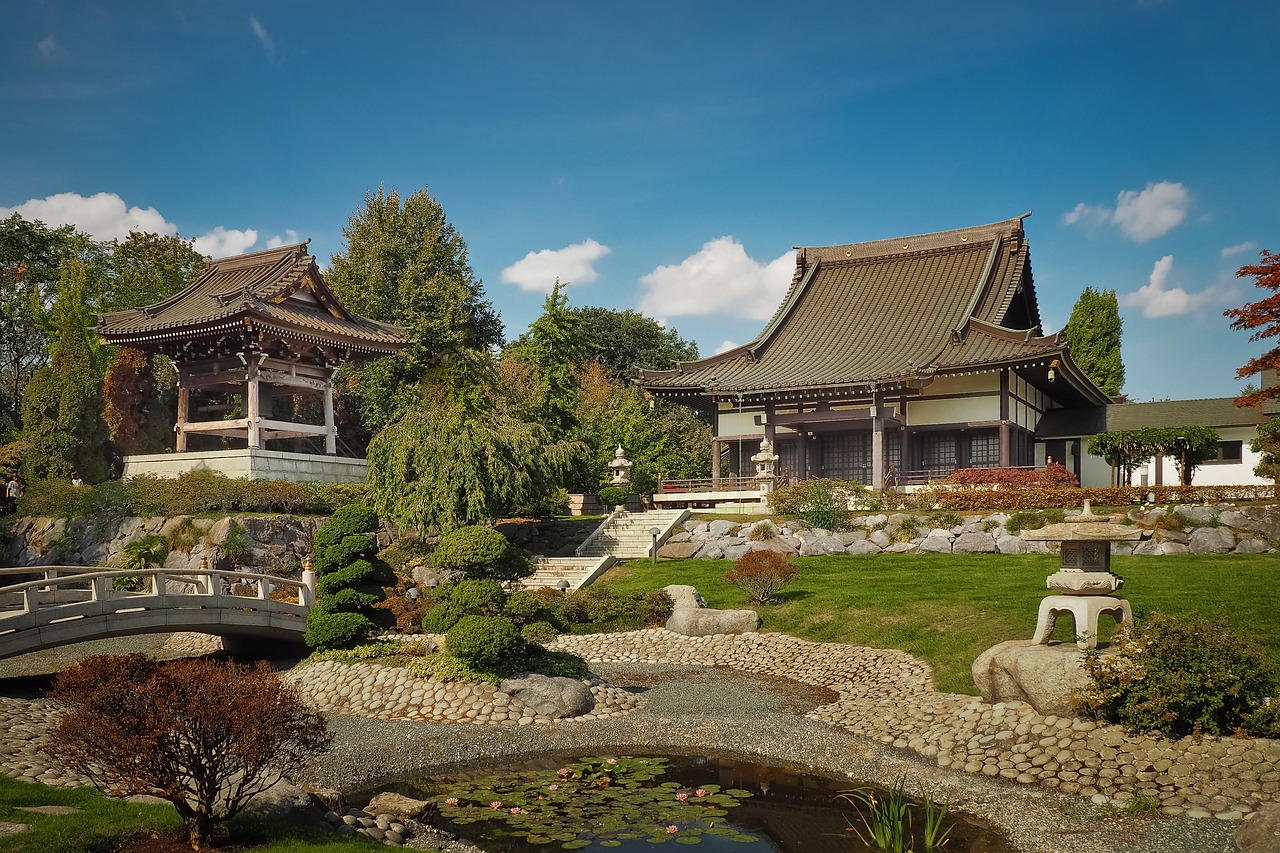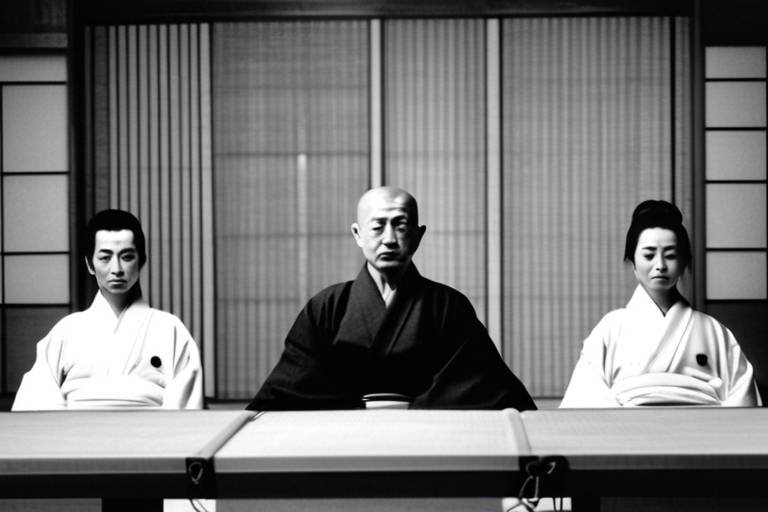The Influence of Zen Philosophy in Japanese Politics
Zen philosophy, with its profound roots and timeless principles, has significantly influenced the political landscape of Japan. It’s not just a spiritual practice; it’s a lens through which many Japanese leaders view governance and decision-making. Imagine a world where political leaders embrace mindfulness, prioritizing harmony and ethical considerations over power struggles. This is the essence of Zen's impact on Japanese politics. From historical roots to contemporary practices, the integration of Zen principles has shaped leadership styles, fostered cooperative governance, and encouraged a unique approach to conflict resolution.
At the heart of Zen philosophy lies the idea of simplicity and clarity. In a world often clouded by complexity and chaos, Zen encourages individuals, especially leaders, to strip away the unnecessary and focus on what truly matters. This approach resonates deeply within the political arena, where clarity of thought and purpose can lead to decisive action and effective governance. The historical introduction of Zen Buddhism to Japan in the 12th century laid the groundwork for these principles to permeate various aspects of Japanese culture, including its political thought.
As we explore the intertwining of Zen philosophy and Japanese politics, it becomes clear that the emphasis on mindfulness and ethical decision-making is not merely an abstract concept but a practical approach that has yielded tangible results. Leaders who embody these principles often find themselves navigating the complexities of governance with a sense of calmness and poise, fostering an environment where collaborative decision-making thrives.
Moreover, the concept of 'wa' (harmony) is integral to Zen philosophy and serves as a cornerstone in Japanese political thought. It promotes a culture of consensus-building and encourages leaders to seek common ground rather than engage in divisive tactics. This harmonious approach has been instrumental in maintaining Japan's political stability and social cohesion over the centuries. In essence, Zen philosophy offers a framework that aligns with the collective spirit of the Japanese people, making it a powerful force in shaping political ideologies.
In the following sections, we will delve deeper into how Zen practices, such as meditation and reflection, have found their way into political decision-making processes. These practices not only enhance emotional intelligence among leaders but also promote a culture of accountability and responsible governance. As we navigate through the complexities of modern politics, the lessons drawn from Zen philosophy remain ever-relevant, guiding leaders toward a more enlightened and ethical path.
- What is Zen philosophy? Zen philosophy is a branch of Buddhism that emphasizes meditation, mindfulness, and the pursuit of enlightenment through direct experience.
- How did Zen influence Japanese politics? Zen has shaped Japanese political thought by promoting values such as harmony, consensus-building, and ethical decision-making.
- What is the significance of 'wa' in Japanese politics? 'Wa' represents harmony and balance, encouraging cooperative governance and conflict resolution strategies.
- Are there modern examples of Zen practices in politics? Yes, many contemporary leaders in Japan incorporate meditation and mindfulness into their decision-making processes.

The Historical Roots of Zen in Japan
This article explores how Zen philosophy has shaped Japanese political thought, governance, and leadership styles, highlighting its historical roots and contemporary implications in the political landscape of Japan.
Zen Buddhism was introduced to Japan in the 12th century, primarily through the efforts of monks returning from China. This arrival marked a significant cultural shift, as Zen began to intertwine with the existing Shinto and Buddhist practices, creating a unique tapestry of spiritual thought. The essence of Zen—characterized by simplicity, mindfulness, and direct experience—found its way into various aspects of Japanese life, including art, literature, and importantly, governance.
During the Kamakura period, Zen gained substantial traction among the samurai class, who were drawn to its emphasis on discipline and meditation. This connection to the warrior class was not merely coincidental; it was a reflection of the turbulent times in which they lived. As the samurai sought to cultivate inner peace amidst chaos, Zen provided a framework for understanding their roles in society. The teachings of Zen encouraged a focus on the present moment, fostering resilience and clarity in decision-making, traits that would later influence political leaders.
Moreover, the historical context of Zen’s introduction is crucial for understanding its impact on Japanese political thought. The feudal system that dominated Japan during this era was characterized by a rigid hierarchy and constant power struggles. Zen philosophy, with its emphasis on harmony and balance, offered a counter-narrative to the prevailing conflicts. It encouraged leaders to seek consensus and promote stability, laying the groundwork for a governance style that valued cooperation over confrontation.
As Zen continued to evolve, it began to permeate the cultural and political fabric of Japan. The establishment of Zen temples, such as Daitoku-ji and Nanzen-ji, not only served as spiritual centers but also as places where political discourse could flourish. These temples became hubs for intellectual exchange, where ideas about governance, ethics, and leadership were debated and refined. This intellectual environment nurtured a generation of leaders who were influenced by Zen principles, leading to a governance style that prioritized ethical considerations and collective well-being.
In contemporary Japan, the legacy of Zen philosophy is still evident. Political leaders often reference Zen concepts in their speeches and policies, highlighting the enduring relevance of these ancient teachings. The principles of mindfulness and reflection are increasingly recognized as vital components of effective leadership, encouraging a more compassionate approach to governance. As Japan navigates the complexities of modern politics, the historical roots of Zen continue to provide valuable insights into the art of leadership and the importance of harmony in society.
- What is Zen Buddhism? Zen Buddhism is a school of Mahayana Buddhism that emphasizes meditation and direct experience of enlightenment.
- How did Zen influence Japanese politics? Zen influenced Japanese politics by promoting values like mindfulness, harmony, and consensus-building, which shaped leadership styles and governance.
- What are some key principles of Zen philosophy? Key principles include simplicity, mindfulness, and the concept of 'wa' (harmony).
- Can Zen practices be applied in modern governance? Yes, practices such as meditation and reflection can enhance emotional intelligence and ethical decision-making in political leadership.

Zen Philosophy and Leadership Styles
Zen philosophy has a profound impact on leadership styles in Japan, shaping the way leaders approach their roles and responsibilities. At its core, Zen emphasizes mindfulness, simplicity, and clarity. These values are not just abstract concepts; they translate into practical approaches that leaders adopt in their daily decision-making processes. Imagine a leader who, instead of rushing into decisions, takes a moment to breathe, reflect, and consider the broader implications of their actions. This is the essence of Zen-influenced leadership.
One of the most significant aspects of Zen philosophy is its focus on consensus and harmony. In a political landscape often marked by division, the Zen approach fosters an environment where collaboration is prioritized. Leaders who embody these principles tend to seek out the opinions of their team members and strive for collective agreement before making decisions. This methodology not only enhances team morale but also leads to more sustainable and widely accepted outcomes. It’s like a well-conducted orchestra, where each musician plays their part, contributing to a harmonious whole.
Moreover, Zen principles encourage leaders to practice ethical decision-making. The emphasis on mindfulness allows them to pause and reflect on the potential consequences of their actions, leading to more responsible governance. For instance, when faced with a contentious issue, a Zen-influenced leader might take a step back to meditate on the ethical implications, ensuring that their choices align with both their personal values and the greater good of society.
Another vital component of Zen leadership is the concept of 'wa', which translates to harmony. This idea is not just about avoiding conflict but actively creating an environment where peaceful coexistence and cooperation flourish. Leaders who embrace 'wa' are often seen as facilitators of dialogue, guiding discussions toward common ground rather than allowing disagreements to escalate. This approach is particularly valuable in political negotiations, where finding a middle path can lead to innovative solutions and lasting agreements.
In summary, Zen philosophy profoundly influences Japanese leadership styles by promoting mindfulness, consensus-building, and ethical decision-making. Leaders who embody these principles are not just effective; they also inspire trust and respect among their followers. As we explore further into the political landscape of Japan, it becomes clear that the integration of Zen practices into governance has created a unique and resilient leadership paradigm.
- How does Zen philosophy influence decision-making in politics?
Zen encourages leaders to practice mindfulness and reflection, leading to more thoughtful and ethical decisions. - What is the significance of 'wa' in Japanese politics?
'Wa' represents harmony, promoting cooperative governance and conflict resolution. - Can Zen practices be applied in modern political contexts?
Yes, many contemporary leaders incorporate meditation and mindfulness into their routines to enhance emotional intelligence.

The Concept of 'Wa' (Harmony)
The concept of 'wa', which translates to harmony, is a cornerstone of Zen philosophy and plays a pivotal role in Japanese culture and politics. Imagine a finely tuned orchestra where every instrument contributes to a beautiful symphony; this is akin to how 'wa' fosters a sense of unity and cooperation among individuals and groups. In a society where harmony is valued, the emphasis is not merely on individual achievement but on the collective well-being of the community. This principle encourages people to work together, creating a seamless blend of ideas and actions that promote peace and stability.
In the realm of politics, the idea of 'wa' influences how leaders approach governance and decision-making. Rather than adopting a confrontational stance, politicians who embody the spirit of 'wa' prioritize dialogue and consensus. This approach is particularly evident in Japan's political landscape, where collaborative efforts are often seen as more effective than divisive tactics. The emphasis on harmony extends to various aspects of governance, including policy formulation, public discourse, and even international relations.
Moreover, the concept of 'wa' encourages conflict resolution strategies that are rooted in understanding and empathy. When disagreements arise, the focus shifts from winning arguments to finding common ground. This is not just a theoretical ideal; it manifests in practical ways, such as:
- Dialogue Sessions: Regular meetings where stakeholders come together to discuss issues openly.
- Consensus Workshops: Facilitated sessions designed to build agreement among diverse groups.
- Community Engagement: Encouraging public participation in decision-making processes to ensure that all voices are heard.
By fostering an environment where 'wa' is prioritized, Japanese politics has historically achieved a level of stability and social cohesion that is often admired worldwide. The ability to navigate conflicts without resorting to aggression or division is a testament to the profound influence of Zen philosophy on political thought. In essence, 'wa' serves as a guiding principle that not only shapes the interactions among leaders and citizens but also reinforces the very fabric of Japanese society.

Consensus-Building in Governance
In the intricate tapestry of Japanese politics, the principle of consensus-building stands out as a hallmark of governance, deeply rooted in Zen philosophy. This approach is not merely a procedural formality; it embodies a profound understanding of human relationships and the need for collective harmony. Imagine a well-tuned orchestra where each musician plays their part in unison, creating a melodious symphony. That’s the essence of consensus in governance—a harmonious blend of diverse voices coming together to make decisions that resonate with the populace.
At its core, consensus-building prioritizes collaboration over conflict. In a political landscape where differing opinions are inevitable, Zen-inspired leaders strive to create an environment where dialogue flourishes. This method encourages all stakeholders to engage openly, fostering a sense of belonging and ownership in the decision-making process. The beauty of this approach lies in its ability to transform potential discord into constructive discussions, allowing for innovative solutions to emerge. For instance, during critical policy discussions, leaders often facilitate workshops that encourage brainstorming sessions, ensuring that every voice is heard and valued.
Moreover, consensus-building is not just about reaching an agreement; it’s about nurturing relationships and trust among political actors. By engaging in active listening and empathetic communication, leaders can bridge the gaps between opposing viewpoints. This is akin to a gardener tending to a diverse garden, ensuring that each plant receives the care it needs to thrive. Such nurturing creates a fertile ground for collaboration, leading to sustainable policies that reflect the collective will of the people.
Historically, Japan has demonstrated remarkable political stability, often attributed to this consensus-driven approach. The post-war era, for instance, showcased a remarkable ability to unite various political factions around common goals, such as economic recovery and social welfare. This unity not only facilitated rapid growth but also reinforced the social fabric of the nation. As a result, the Japanese political system has been characterized by a unique blend of stability and adaptability, allowing it to navigate challenges effectively.
As we look to the future, the relevance of consensus-building in governance remains paramount. In an increasingly complex world, where issues such as climate change, economic disparities, and global health crises require collective action, the Zen-inspired approach can guide political leaders in fostering cooperation and resilience. By embracing this philosophy, leaders can cultivate a political culture that not only values consensus but also champions the common good, ensuring that governance is reflective of the diverse needs and aspirations of its citizens.
- What is consensus-building in governance?
Consensus-building is a collaborative approach to decision-making where all stakeholders are encouraged to participate and contribute, aiming for a collective agreement that reflects the diverse perspectives within a community. - How does Zen philosophy influence consensus-building?
Zen philosophy emphasizes mindfulness, harmony, and the importance of relationships, which are essential for fostering an environment where open dialogue and cooperation can thrive. - Why is consensus-building important in Japanese politics?
This approach has historically contributed to Japan's political stability, allowing for effective governance that resonates with the people and promotes social cohesion.

Conflict Resolution Techniques
Zen philosophy offers a treasure trove of that not only promote dialogue but also foster a deep understanding among conflicting parties. At the heart of these techniques lies the notion of mindfulness, which encourages individuals to remain present and fully engaged in discussions. This approach allows for a more empathetic perspective, enabling leaders and negotiators to appreciate differing viewpoints without the cloud of emotional turmoil.
One of the fundamental techniques derived from Zen is the practice of active listening. This goes beyond merely hearing words; it involves truly understanding the emotions and intentions behind them. By practicing active listening, political leaders can create an atmosphere where all parties feel valued and acknowledged. This technique not only diffuses tension but also lays the groundwork for collaborative problem-solving.
Another essential aspect of Zen conflict resolution is the emphasis on non-attachment to outcomes. In many political scenarios, leaders may become fixated on winning an argument or achieving a specific result. However, Zen teaches that by letting go of rigid expectations, individuals can approach conflicts with a more open mind. This flexibility often leads to more innovative solutions that satisfy all parties involved.
Furthermore, Zen encourages the use of meditative pauses during heated discussions. These pauses allow individuals to step back, breathe, and regain their composure. By taking a moment to reflect, leaders can respond thoughtfully instead of reacting impulsively. This technique is particularly valuable in high-stakes political negotiations, where emotions can run high and decisions need to be made judiciously.
Incorporating these Zen-inspired techniques into political practice has proven beneficial not only within Japan but also in international diplomacy. For instance, Japan's approach to conflict resolution often involves
- Establishing a safe space for dialogue
- Encouraging mutual respect among parties
- Utilizing facilitation techniques to guide discussions
In conclusion, the integration of Zen conflict resolution techniques into political discourse not only enhances interpersonal relationships but also cultivates a culture of collaboration and understanding. As political landscapes continue to evolve, the wisdom of Zen remains relevant, offering timeless strategies for navigating the complexities of human interaction.
- What are the main principles of Zen philosophy? Zen philosophy emphasizes mindfulness, simplicity, and the importance of living in the present moment.
- How can Zen practices improve political decision-making? Zen practices, such as meditation and reflection, help leaders approach challenges with clarity, emotional intelligence, and ethical considerations.
- What is active listening, and why is it important? Active listening is the practice of fully engaging with what others are saying, fostering understanding and reducing conflict.
- Can Zen conflict resolution techniques be applied in non-political contexts? Absolutely! These techniques can be beneficial in any situation involving conflict, including personal relationships and workplace dynamics.

Zen's Influence on Political Ideology
Zen philosophy, with its deep-rooted spiritual values, has intricately woven itself into the fabric of Japanese political ideology. This unique blend of spirituality and governance has birthed a political landscape that is unlike any other. At its core, Zen promotes the idea of interconnectedness, urging leaders to see beyond their immediate interests and understand the broader implications of their policies. This perspective fosters a sense of responsibility towards the community and the environment, which can be seen in various political movements across Japan.
One of the most significant impacts of Zen on political ideology is its contribution to the concept of nationalism. Unlike the aggressive nationalism seen in many parts of the world, Japanese nationalism influenced by Zen is characterized by a sense of harmony and balance. It encourages citizens to take pride in their cultural heritage while remaining open to global influences. This harmonious nationalism promotes peace and understanding, aligning with Zen's fundamental principles.
Moreover, Zen philosophy has also shaped the Japanese approach to democracy. In a society where consensus is valued, the democratic process is often more about collective decision-making than individual power struggles. This is evident in Japan's political practices, where leaders strive to create a sense of community and shared purpose. The Zen-inspired emphasis on dialogue and mutual respect fosters an environment where diverse opinions can coexist, leading to more inclusive governance.
Additionally, Zen's teachings on social justice have prompted political movements aimed at addressing inequality and promoting welfare. The principles of compassion and empathy, central to Zen, encourage leaders to prioritize the needs of the marginalized and disadvantaged. This approach has led to policies focused on social equity, ensuring that all citizens have access to the resources they need to thrive.
To illustrate the influence of Zen on political ideology, consider the following table that highlights key areas of impact:
| Political Ideology | Zen Influence |
|---|---|
| Nationalism | Focus on harmony and cultural pride without aggression |
| Democracy | Emphasis on consensus-building and collective decision-making |
| Social Justice | Promotion of compassion and empathy in policy-making |
In summary, Zen philosophy has profoundly influenced Japanese political ideology, creating a unique blend of spirituality and governance. This influence is evident in the nation’s approach to nationalism, democracy, and social justice, fostering a political climate that prioritizes harmony, inclusivity, and ethical responsibility. As Japan continues to navigate the complexities of modern governance, the enduring wisdom of Zen may serve as a guiding light for future leaders.
- How has Zen philosophy influenced Japanese politics?
Zen philosophy has shaped Japanese political thought by promoting values such as harmony, consensus-building, and ethical governance, leading to a unique political landscape. - What role does meditation play in political decision-making?
Meditation encourages clarity and calmness, allowing leaders to approach challenges thoughtfully and make informed decisions. - Can Zen principles be applied to modern governance?
Yes, the principles of Zen, such as mindfulness and reflection, can enhance emotional intelligence and ethical considerations in contemporary political practices.

Zen Practices in Political Decision-Making
In the dynamic realm of politics, where decisions can ripple through society like a stone thrown into a pond, the integration of Zen practices has emerged as a transformative approach. These practices, rooted deeply in the principles of mindfulness and reflection, offer politicians a way to navigate the complexities of governance with a sense of clarity and calmness. Imagine a leader standing at a crossroads, each path representing a different political choice. By applying Zen practices, they can pause, reflect, and choose the path that resonates most with the values of their constituents and the greater good.
At the heart of these Zen practices is meditation, a technique that encourages individuals to quiet their minds and focus on the present moment. For politicians, this practice can lead to improved emotional intelligence, allowing them to respond thoughtfully rather than react impulsively. When leaders take the time to meditate, they often find that their decisions are more balanced, considering not just their immediate political gain but also the long-term effects on society. This is crucial in a world where political decisions can have profound implications for future generations.
Moreover, reflection serves as another cornerstone of Zen practices in political decision-making. This involves a deliberate examination of past actions and their consequences. Politicians who engage in reflective practices are more likely to take responsibility for their decisions, fostering a culture of accountability. By reflecting on their experiences, leaders can learn from their mistakes and successes alike, which is essential for ethical governance. Imagine a political leader who, after a significant policy decision, takes the time to analyze the outcomes, seeking input from various stakeholders. This not only enhances their understanding but also builds trust with the public.
To illustrate the impact of Zen practices on political decision-making, consider the following table that outlines the key benefits:
| Zen Practice | Benefits in Political Decision-Making |
|---|---|
| Meditation | Enhances emotional intelligence, promotes thoughtful responses, reduces stress. |
| Reflection | Encourages accountability, aids in learning from past decisions, fosters ethical governance. |
| Mindfulness | Improves focus on current issues, encourages a balanced perspective, enhances clarity in communication. |
Incorporating these Zen practices into political processes isn't just about personal growth for leaders; it's about cultivating an environment where ethical governance flourishes. When politicians prioritize mindfulness, they are more likely to engage in constructive dialogues, seek consensus, and ultimately create policies that reflect the collective will of the people. This approach can transform the often adversarial nature of politics into a more collaborative and harmonious endeavor.
As we look towards the future of Japanese politics, the influence of Zen practices promises to play a pivotal role. By embracing mindfulness, meditation, and reflection, leaders can navigate the turbulent waters of governance with grace and integrity, ensuring that their decisions resonate positively within society. The question remains: will future leaders recognize the value of these ancient practices, or will they continue to be overshadowed by the fast-paced, often chaotic nature of modern politics? Only time will tell, but the potential for a more thoughtful and compassionate political landscape is certainly within reach.

Meditation and Mindfulness in Politics
Meditation and mindfulness are not just buzzwords in the wellness community; they have become essential tools in the realm of politics, especially in Japan. Imagine a politician stepping into a high-stakes meeting, not frazzled by the pressures of the moment, but calm, collected, and focused. This is the power of mindfulness. By incorporating meditation into their daily routines, political leaders can cultivate a sense of clarity that allows them to navigate complex issues with ease and poise. It’s like sharpening a knife before cutting through a dense forest of bureaucracy—essential for effective governance.
In Japan, where the cultural roots of Zen run deep, the practice of mindfulness has found its way into political decision-making. Leaders who engage in meditation often report increased emotional intelligence, which is crucial when dealing with constituents' diverse needs. By taking a moment to reflect before responding, these leaders can engage more thoughtfully, considering the broader implications of their decisions. This practice not only enhances personal well-being but also fosters a more empathetic approach to leadership.
Moreover, mindfulness encourages leaders to be present in the moment, which is vital during negotiations or public speaking. When a politician is fully engaged, they can better read the room and respond to the subtle cues of their audience. This ability to connect on a human level can lead to more productive discussions and a greater sense of trust between leaders and the public. It's like being a conductor of an orchestra, where every note and pause matters in creating a harmonious outcome.
To illustrate the impact of meditation and mindfulness in politics, consider the following table that highlights the benefits:
| Benefits of Meditation and Mindfulness | Description |
|---|---|
| Enhanced Focus | Leaders can concentrate better on the task at hand, leading to improved decision-making. |
| Emotional Regulation | Practicing mindfulness helps in managing emotions, reducing stress and anxiety. |
| Improved Empathy | Mindfulness fosters a deeper understanding and connection with others' feelings and perspectives. |
| Better Conflict Resolution | Mindful leaders approach conflicts with a calm demeanor, facilitating more constructive dialogues. |
In conclusion, the integration of meditation and mindfulness into political practices is not merely a trend; it represents a significant shift towards more thoughtful, compassionate, and effective governance. As Japan continues to navigate its complex political landscape, the lessons from Zen philosophy remind us that sometimes, the best way to lead is to pause, breathe, and reflect. After all, in the fast-paced world of politics, taking a moment to center oneself can lead to decisions that resonate deeply with the values of the people they serve.
- How does mindfulness improve political decision-making? Mindfulness enhances focus and emotional regulation, allowing leaders to make more thoughtful and responsible choices.
- Can meditation really impact a leader's effectiveness? Yes, meditation can improve emotional intelligence and empathy, which are crucial for effective leadership.
- Is mindfulness widely practiced in Japanese politics? While it's gaining traction, the integration of mindfulness into political practices is still evolving in Japan.
- What are some techniques for practicing mindfulness? Techniques include meditation, deep breathing, and reflective journaling, which can help leaders stay grounded.

Reflection and Ethical Governance
In the realm of politics, the practice of reflection is not just a personal endeavor; it is a vital component of ethical governance. Zen philosophy advocates for a deep sense of self-awareness, urging leaders to pause and consider their actions and decisions critically. This practice of reflection allows politicians to step back from the frenetic pace of political life and engage in a form of introspection that can lead to more responsible and ethical decision-making.
When leaders engage in reflection, they are better equipped to understand the implications of their policies and actions. This heightened awareness can lead to a more profound understanding of the needs and concerns of their constituents. For instance, a politician who takes time to reflect might recognize how a proposed law could disproportionately affect a marginalized community, prompting them to reconsider or modify their approach.
Moreover, reflection fosters a culture of accountability. When leaders routinely examine their motivations and the outcomes of their decisions, they cultivate a sense of responsibility not just for their actions but also for their impact on society. This is crucial in a political landscape where transparency and integrity are paramount. By embracing reflection, leaders can ensure that they are not merely reacting to events but are instead acting with intention and purpose.
Zen practices encourage this reflective mindset through various techniques, such as meditation and journaling. For example, a simple meditation session can help leaders clear their minds of distractions, allowing them to focus on the ethical dimensions of their governance. Journaling, on the other hand, can serve as a powerful tool for articulating thoughts and feelings, making it easier to analyze and understand complex issues. As a result, these practices can lead to more thoughtful and compassionate governance.
In essence, the integration of reflection into political decision-making is not just about personal growth; it is about enhancing the moral fabric of governance. Ethical governance requires leaders to be mindful of their responsibilities and the broader impact of their choices. By embracing reflection as a core practice, politicians can cultivate a leadership style that is not only effective but also deeply rooted in ethical considerations.
- How does Zen philosophy influence political decision-making?
Zen philosophy encourages mindfulness and reflection, allowing leaders to make more thoughtful and ethical decisions. - What are the benefits of reflection in governance?
Reflection promotes accountability, enhances understanding of constituents' needs, and fosters responsible decision-making. - Can meditation really impact political leadership?
Yes, meditation can help leaders manage stress, improve emotional intelligence, and approach challenges with clarity. - How does ethical governance relate to Zen practices?
Zen practices emphasize self-awareness and ethical considerations, leading to more responsible and compassionate governance.
Frequently Asked Questions
- What is Zen philosophy?
Zen philosophy is a school of Mahayana Buddhism that emphasizes meditation, mindfulness, and the direct experience of reality. It encourages individuals to seek enlightenment through personal insight rather than through scriptures or rituals.
- How has Zen influenced Japanese politics?
Zen has profoundly shaped Japanese political thought by promoting values such as harmony, consensus, and ethical decision-making. These principles have influenced leadership styles and governance, fostering a political environment that prioritizes cooperation and social stability.
- What does 'wa' mean in the context of Zen and politics?
'Wa' translates to harmony and balance, which are central tenets of Zen philosophy. In Japanese politics, this concept encourages cooperative governance and effective conflict resolution, making it a foundational element in political interactions.
- How do Zen practices like meditation impact political leaders?
Meditation and mindfulness help political leaders cultivate emotional intelligence and resilience. By incorporating these practices, leaders can approach challenges with clarity and calmness, leading to more thoughtful and effective governance.
- Can Zen principles aid in conflict resolution?
Absolutely! Zen principles promote dialogue and understanding, which are essential for resolving conflicts. These techniques have been applied in political negotiations, contributing to more peaceful and productive international relations.
- What role does reflection play in ethical governance?
Reflection is a critical aspect of Zen practice that fosters self-awareness and ethical considerations. By encouraging leaders to reflect on their actions and decisions, it promotes accountability and responsible governance.
- Are there contemporary examples of Zen influence in Japanese politics?
Yes, many contemporary Japanese leaders incorporate Zen principles into their governance styles. This can be seen in their approaches to consensus-building and conflict resolution, which are evident in both domestic policies and international diplomacy.


















